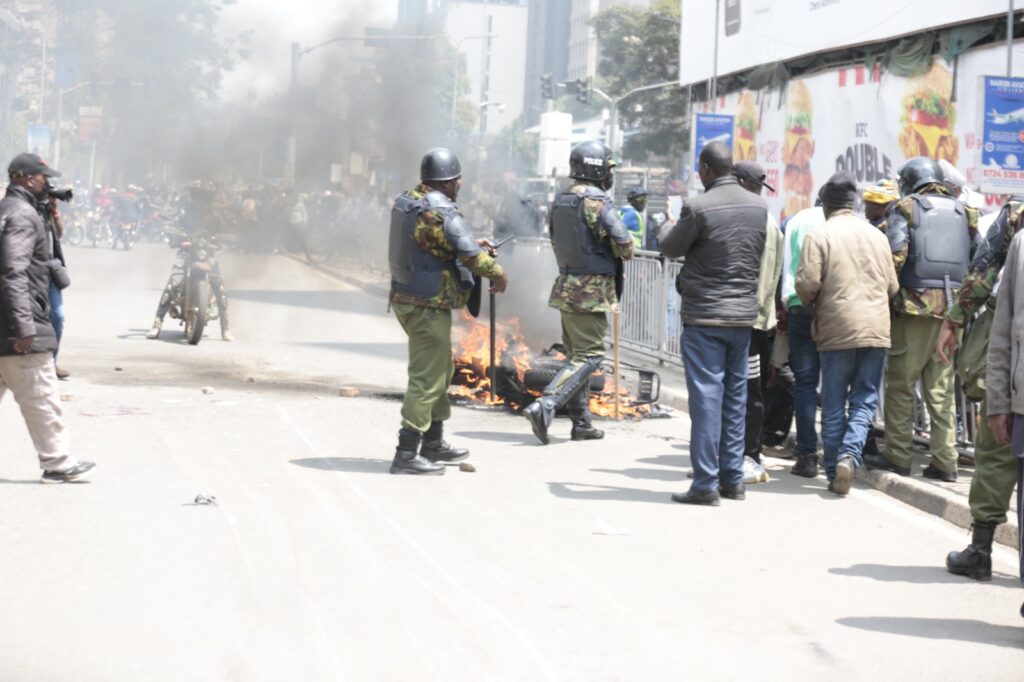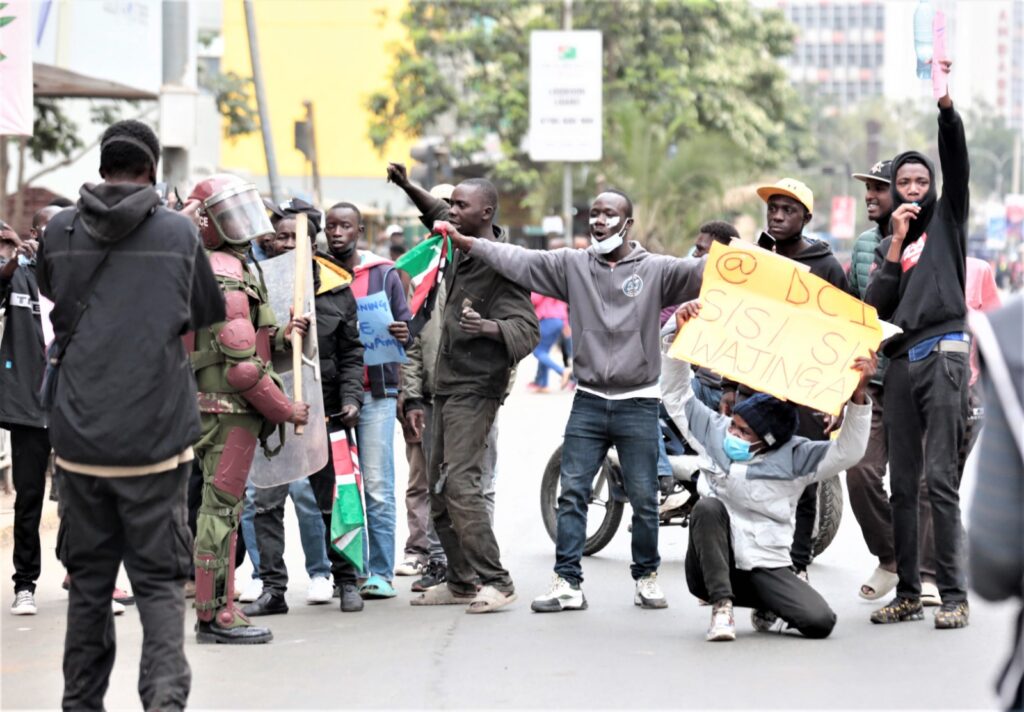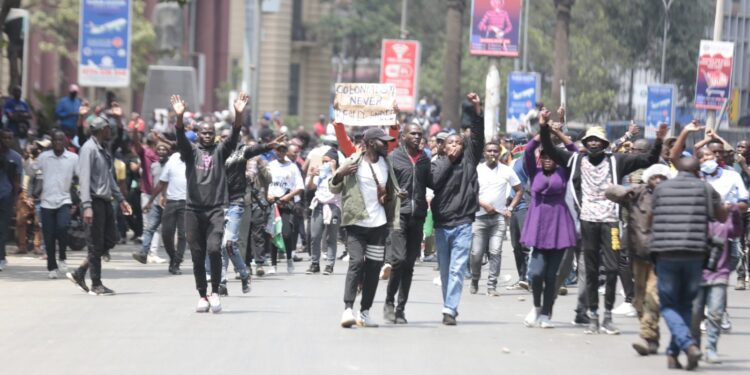On 28th October 2024, a coterie of plain-clothed security personnel raided the home of Boniface Mwangi in Machakos, abducted him, and carted him off to Kamukunji police station. He was later released.
Another activist Scophine Aoko who goes by the name Maverick Aoko, disappeared in Nairobi, a few days before Mwangi was arrested.
Mwangi and Aoko are former journalists at Standard Media Group and have been the face of Gen-Z bread protests which have morphed into a groundswell of resentment against President William Ruto’s government.
Their arrests follow a disturbing pattern of abductions of protestors and civic leaders who are often held incommunicado in ungazetted places and are subjected to egregious torture methods.
The abductions come when the country last week, marked exactly two years after Pakistani journalist, Arshad Sharif, was gunned down by police in Kajiado County on October 23, 2022. Initially, police claimed the shooting was a case of mistaken identity. According to an inquiry conducted by a team of Pakistani investigators, the attack was meticulously planned turning Nairobi and its outskirts into a theatre of cloak-and-dagger foreign espionage.
Two years after President William Ruto and his Kenya Kwanza government ascended the greasy pole, there has been an attempt to torpedo freedoms of media, speech, and assembly.
Killings, abductions, torture, detentions in ungazetted dungeons, and surveillance, have become the tools of coercion to muzzle an unfettered media and a vibrant civil society and opposition. These acts peaked during June 2024, Gen-Z led protests, which convulsed the country and prompted the President to sack his entire Cabinet and to withdraw the Finance Bill 2024, which was meant to hike taxes.
Most of these abductions and attempts to whittle down a vibrant media and civil society violate several rights enshrined in the Bill of Rights chapter of the Constitution including Article 33 (freedom of expression), Article 34 (freedom of the media), and Article 36 (freedom of association) of the Constitution of Kenya 2010. Internationally, these freedoms are also guaranteed by Article 19 of the International Covenant on Civil and Political Rights (ICCPR) and Article 9 of the African Charter on Human and Peoples’ Rights (ACHPR).
“A deeply alarming development in this pattern of repression is the shooting of journalist Catherine Wanjeri wa Kariuki as she covered protests in Nakuru in Kenya. This tragic event underscores the violence journalists have faced while covering demonstrations,” said Faith Odhiambo, president of the Law Society of Kenya (LSK).
Several journalists have been targeted by security police and some have been arrested. “Reporters have found doing their jobs increasingly dangerous, with the Media Council of Kenya—an independent national institution—documenting 24 incidents against journalists, including abductions, beatings, and online harassment. Disturbingly, 10 of these incidents were directly perpetrated by the police,” Ms Odhiambo said.
Multiple journalists have been injured, including by tear gas canisters during protests, while another journalist was abducted by police in what authorities later claimed was a case of “mistaken identity.”
Ms Odhiambo said, “As of 23rd June 2024, the Police Reform Working Group had documented at least 22 abductions, 50 arrests, 300 injuries, and 23 deaths, all attributed to police actions during the protests. Furthermore, the Kenya National Human Rights Commission reported as of 16th July 2024 that 50 deaths, 413 injuries, 682 arbitrary detentions, and 59 cases of abductions or missing persons were linked to the protests”.
Muthoki Mumo, the Africa Program Coordinator of the Committee to Protect Journalists (CPJ)said failure to ensure accountability in Sharif’s case is emblematic of the impunity that has characterised attacks on journalists in Kenya. “No one has ever been held accountable for the killings of journalists Francis Nyaruri, murdered in 2009, and John Kituyi, murdered in 2015,” Ms Mumo said.
It all began in April last year when the opposition led by the Azimio coalition’s leader Raila Odinga mobilised his supporters to protest against the high cost of living and a regressive tax policy that hiked prices on basic commodities.
This year, the protests reached a crescendo when the protesters scaled the defensive barriers and burnt Parliament and the Supreme Court. Ruto’s praetorian guard relied on the barrel of the gun to nip protests in the bud, which resulted in the death of about 40 youthful protestors, despite Article 37 of the Constitution of Kenya granting citizens to peaceably assemble, demonstrate, picket, and present petitions to public authorities.
No inquiry has been established to find the perpetrators of these extrajudicial killings and to charge them in competent courts of law.
“In June this year, government agents informed us that our Kenya Television Network (KTN) will be switched off if we don’t stop covering protests. We contested this order because we have never witnessed this in our operations since 1997 when Standard Media Group rolled out KTN as the first private radio-television station in Kenya,” said a manager who preferred not to be identified at the media group based in Nairobi.
Journalism plays a critical role in shaping public debate and informing the citizenry and its stories are more accurate in the fast-paced media ecosystem littered with misinformation and disinformation.
The government has deployed sophisticated spyware to collect journalists’ passwords, text messages, emails, and mobile phone calls, and identify locations where journalists work and live.
“I have been forced to move out of a house, which I have lived in for a decade because I am no longer safe. In my new place, I have secured my door and can’t come out at night. I no longer go out for night functions because I have received threatening text messages warning me that I will be killed if I don’t stop writing negatively about the government,” said a journalist based in Homabay, Nyanza region, who preferred to speak anonymously.
The space for dissenting voices has shrunk, with those speaking out against the administration facing increasing hostility, intimidation, and, in many cases, violence. “The persecution of journalists by the current regime is incomparable to any other. A lot of freedom has been eroded. During anti-government demonstrations, police acted with total disregard to press freedom by targeting journalists. We were warned against photographing or filming police as they engaged demonstrators,” said Erastus Mulwa, a journalist based in Machakos County in the Eastern region.

“Our work has been affected in a big way. The working environment has been hell for journalists. Fear is now a key factor among many journalists. The majority do not trust State agencies. As a result, the public is denied the right to know the truth. Impunity wins. At the current rate, and without any intervention, press freedom in Kenya is facing a major challenge,” Mulwa said.
Olivia Odhiambo, a journalist based in Kisumu County in Nyanza region, says freedom of the media and speech have diminished under the current government.
“There are stories that I am not able to work on because of my own safety. Also, these stories are very important and impact Kenyans directly, so this means they cannot be highlighted as a result of the government’s threats on journalists,” Ms Odhiambo said.
She noted that journalists now live in constant threats for their lives. “Now we have so many cases of missing bloggers. I have been a victim of police brutality. I went to Kisumu Polytechnic for a story interview but a male officer guarding the gate started harassing me despite providing my media identity card until his boss intervened,” Ms Odhiambo said.
Collins Kweyu, a photojournalist based in Nairobi says, “I have on very many occasions been attacked by police officers and my pictures deleted. The experience was very much humiliating as it was witnessed by members of the public who saw me being arrested and frogmarched to Central police station.”
He noted that journalists who expose corruption face a greater danger of being attacked, abducted, or killed.
“During the other regimes especially during the late Mwai Kibaki’s regime, there were not too many abductions, disappearances and killing of those critical to the government. Journalists as key witnesses in some sensitive cases need to enjoy full protection to avoid being harmed or killed,” Kweyu said.
However, former Machakos Senator, who is now a commissioner at the Parliamentary Service Commission (PSC) said Kenya Kwanza government is better in terms of freedoms of press, speech, and association.
“Use of excessive force is not acceptable. But what we witnessed were not peaceful protests. Police were protecting themselves against attacks by the protesters,” Johnson Muthama said. “Kenyatta said newspapers are used for wrapping meat and not for informing the public. During his reign, I was arrested seven times and accused of 50 charges just because I was supporting opposition leader Raila Odinga. I was given no food, no water, and left with one shoe that served as my pillow at night,” Muthama said.
A senior police officer based in Kisumu who spoke on condition of anonymity told The Standard, how the harassment and atrocities are committed. “We receive orders from our bosses and we are enabled to access Kenyans’ data through phones, emails and we have gadgets that we use to locate where those we want to arrest are. To protect the officers’ identities, we use masks and unregistered vehicles. We also use unmarked bullets or remove them from victims so that they are not traced and used as evidence,” said the officer.
He revealed that the abductions and torture aim to instill fear in journalists and human rights activists. “In some instances, we have carried cameras and posed as journalists to infiltrate their working space and make arrests possible,” the officer said.
He added, “We confiscate cameras, laptops, and phones to be able to track journalists’ work and communication to establish whom they speak to and if they receive any suspicious money from unknown sources. We even interfere with access to the internet. We then take them to court and judge them with the Computer Misuse and Cybercrimes Act.”
Another security officer in Nairobi told The Standard that the government has set up a crack squad to deal with dissenting voices.
“This group has highly-specialised officers spread across Kenya. They are not in uniform and they use unmarked vehicles to hide their identity. They pose as hawkers, maize roasters, egg sellers, bar patrons, and motorcycle riders. This helps them to collect information about the government,” said the officer who did not disclose his identity.
After collecting information about their targets, the officers then trail them and make the arrests. “Once we arrest you, we blindfold you and take you to unknown and abandoned places. There, we torture you to get details of your work, deny you food and water then we abandon you. Torture is supposed to warn you and if you don’t stop, death is a possibility,” the officer said.
Misinformation and disinformation have contributed to the crackdown on media and public protests by fuelling government narratives that portray journalists, human rights activists, and the opposition as instigators of violence or terrorism who are funded by foreign agents.
“These are powerful tools the government exploits to justify crackdowns on media and public protests. By framing dissenters as threats and misusing laws like the Cybercrimes Act, the government effectively curtails freedom of expression and stifles the voices of those who seek to advocate for change,” Ms Odhiambo said.
She revealed that her phone was hacked or tapped, which is a violation of her privacy rights under Article 31 of the Constitution of Kenya 2010, which guarantees the right to privacy. “This form of surveillance, whether targeted at activists, journalists, or legal professionals, is a worrying trend, eroding the freedoms and protections we are all entitled to under the law,” Ms Odhiambo said.
Boniface Okendo- a photojournalist who was beaten up by security personnel in Nairobi called on the government to protect journalists.

“It has been tough on journalists covering hard news like demonstrations as we are always under attack from security officers and at times members of the public. This regime hates the media. When I was attacked, I was held captive and my photos deleted,” Okendo said.
Ms Mumo pointed out that in June last year, then Trade Minister Moses Kuria, threatened the withdrawal of advertisements against private media in Kenya while verbally denigrating journalists.
“The outburst was triggered by reporting into alleged corruption in his ministry. And earlier this year, a Kakamega County official reportedly threatened to kill a journalist. Threats from government officials not only send a ripple of fear through the media community, but they also signal that other forms of attacks on journalists will be tolerated,” Ms Mumo said.
She noted that the 2018 Computer Misuse and Cybercrimes Act, has re-introduced criminal defamation, under the guise of tackling misinformation.
Under international law, criminal defamation is considered to be inconsistent with fundamental rights to freedom of expression and has been frequently used to stifle dissenting speech. A penal code provision on criminal defamation was declared unconstitutional by Kenya’s courts in February 2017,” Ms Mumo said.
In September 2024, the Computer Misuse and Cybercrimes (Amendment) Bill was introduced in Parliament. “This gives authorities great censorship potential that they could deploy to silence dissent or frustrate the free flow of information during politically tense moments,” Ms Mumo said.
She lamented that during the protests earlier this year, Kenya suffered an unprecedented Internet disruption, although telecom companies attributed the incident to an outage on an undersea cable. “But the government still needs to provide an independent and credible accounting of this incident. Internet disruptions undermine press freedom by making it difficult and dangerous for journalists to do their jobs. It is deeply troubling that Kenya has joined the ranks of countries such as Guinea, Tanzania, Ethiopia Sierra Leone, and Uganda, where internet disruptions have been documented during periods of political tension such as protests, civil unrest, or elections,” Ms Mumo said.
This article was created and maintained with the financial support of the German Federal Foreign Office through Deutsche Welle. Its contents are the sole responsibility of (name of the author or name of the newspaper or website or station) and do not necessarily reflect the views of the German Federal Foreign Office or Deutsche Welle.







